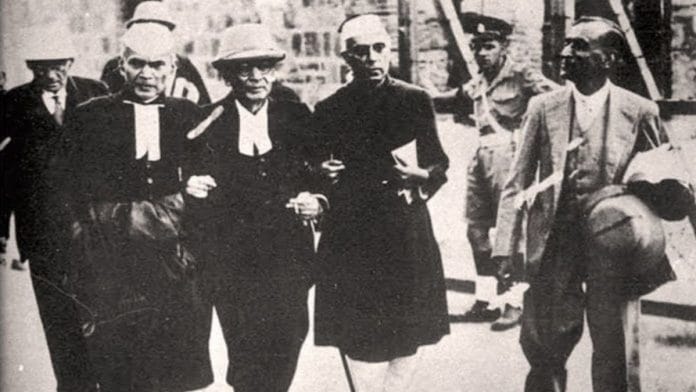It was 1951. Kailash Nath Katju—the hero of the Meerut conspiracy case and the Indian National Army trials—was inside a century-old gothic building with broach spires and pointed arches in his birthplace Jaora, Madhya Pradesh. It was the school he grew up in. And though he returned to it every year, this time he was not alone—with him was India’s new Prime Minister and close friend Jawaharlal Nehru. Katju introduced Nehru to his old teacher; and to the Chambal river, where he asked for a dam ‘to solve the electricity and water problems of Western Madhya Pradesh’. Nehru obliged. But when the prime minister asked the people of the state to vote for Katju in the Lok Sabha elections, he called it an ‘insult’.
“Those were the times”, Advocate General of Uttar Pradesh Kanhaiya Lal Misra’s tribute recorded 17 years later, “when the politicians and statesmen, who came to the forefront under the inspiring guidance of Mahatma Gandhi, had one aim—the waging of a successful war against poverty, ignorance and disease in the service of the motherland. Dr Kailash Nath Katju, in tune with that atmosphere, therefore, naturally rose from height to height and from office to office.”
Katju wasn’t just a prolific lawyer or a celebrated politician of the Indian Independence Movement. Beyond that, he was a man who could furnish a “soldier’s answer” to Lord Mountbatten just as easily as sleeping in a villager’s hut on a small cot. “The urge to serve his people was far too strong. Few among the members of the Bar of this country, who were engaged in the national struggle for freedom, have made a greater sacrifice in terms of practice and with lesser reticence than the late Dr Katju.” former Allahabad High Court Judge and Rajya Sabha MP P.N. Sapru notes.
Also Read: Ram Prasad Bismil was a revolutionary with a poet’s heart. He’s an icon of Hindu-Muslim unity
Katju’s idea of law
Kailash Nath Katju was part of the very first team that the Congress put together to defend Subhas Chandra Bose’s Indian National Army (INA) soldiers who were held captive by the British, and court-martialed with multiple charges like treason, torture, murder, and abetment to murder, following the Second World War.
As a lawyer, he was one of few who spoke against the idea of the death penalty and maintained that capital punishment would lead to more acquittals. He was also put under preventive detention following the failure of Cripps Mission.
According to Justice Sapru, “Dr Katju enjoyed the reputation of being one of the greatest case winners which the Allahabad High Court has produced. All this was possible, apart from his legal erudition and gifted intellect, because of his phenomenal capacity of sifting essential from the non-essential…He would adapt himself to the temperament of the Judges and the nature of the case. Nobody knew his judges better than he knew.”
In a speech delivered at the Allahabad University Law College Society on 6 February 1946, Katju said: “…it seems to me after about 40 years’ experience at the Bar that if one were to look matters squarely in the face…litigation is…nothing but a war between private parties; and in such war…perjuries are permissible, forgeries are permissible, any sort of device by which you can win your cause is permissible.”
Also Read: Behramji Malabari—Parsi activist who fought widowhood, child marriage in Hindu society
Politics and scholarly career
Katju’s political career, just like his legal one, spanned decades and territories. He served as the Governor of Orissa and later, West Bengal; the Chief Minister of Madhya Pradesh; the Union Home and Law Minister; and the Union Defence Minister. He was both a legal and social advocate, his contribution to legally protecting the rights of freedom fighters.
Katju was also very involved in education where his main concern would be the welfare of his students. He taught them to empower the oppressed and to empathise with them without endorsing socialism or Marxist theories. Katju encouraged innovative thinking and the free expression of factual beliefs.
“A life in the law courts is in many ways a liberal education. While you come across rogues and disreputable persons, and you may even be called upon to argue for the shady side of a transaction, somehow much depends upon the personal character of an advocate and his reputation among his fellow citizens. As water seeks its own level so do litigants flock to advocates who, they think, sympathise with their mode of behaviour and outlook on life,” Katju wrote in his autobiography and memoir Experiments in Advocacy: A Colossus in the Courts of Justice.
He is also credited to be in the founding team of Associated Journals Ltd. that published the National Herald. Post-independence, as an administrator, he also helped the country take baby steps to claim democracy and freedom. He was one of the prominent faces in talking about the prohibition of intoxicants and was a seasoned debater in Lok Sabha.
Upon Katju’s demise after a year of suffering, K.L. Misra gave him a befitting tribute: “Yesterday, when the flames were shooting up from the funeral pyre consuming the mortal remains of late Dr Kailash Nath Katju, the sad and desolate crowd that stood around him realised that it was the passing away of the remnants of the last of the giants of the last generation.”
(Edited by Srinjoy Dey)






